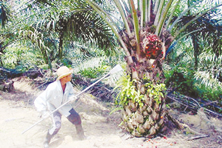
6 November 2014, Daily Express
KOTA KINABALU: Indonesian workers are still the preferred workforce based on the experience of oil palm industry players in West Malaysia.
East Malaysia Planters Association (Empa) Chairman Datuk Othman Walat said however, the association has no objection to any of its members trying out Bangladeshi workers in their plantation.
“In the peninsula, the number of Bangladeshi workers was only 11 per cent of the total workforce in the plantation sector indicating that the adaptability of Bangladeshi is still in question,” he said.
Recently, Human Resources Minister Datuk Richard Riot announced that up to 12,000 Bangladeshis would be recruited to work in Sarawak to fulfil the demand of the stakeholders, particularly the plantation sector.
The Bangladeshis are general labourers who are to be specifically hired for the oil palm sector, a job considered as dirty, difficult and dangerous by Malaysian job seekers who shunned it.
“All these years, Empa has been focussing its workers’ recruitment from Indonesia because they have proven themselves in this industry. They are skilful workers.
“Most of the Empa members especially those in Sabah still have mostly Indonesians working in their plantations,” said Othman.
He opined that plantations in the State should continue to focus on recruiting workers from the neighbouring country especially because the worker pool is still available.
Expansion of oil palm plantation in Indonesia, he said, is expected to continue to be on the slow pace in compliance to environment requirement and global pressure.
“Empa observed that recruitment and maintenance cost of foreign labour are a bit heavy on the industry players. We would like to see the government exempt the payment of foreign workers’ levy as the industry in Sabah had already contributed heavily in the form of 7.5 per cent sales tax.
“We also suggest a government-to-government (Sabah and Sulawesi) engagement to resolve pertinent issues related to the Indonesian labour recruitment, which shall include the possibility of direct entry from Sulawesi to Sabah instead of via Tarakan,” he said.
Othman added that the government should also review its proposal to disallow new woman workers and spouses as the policy could affect labour retention especially harvesters who generally prefer to stay with their families.